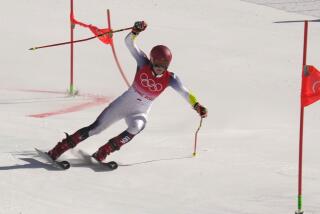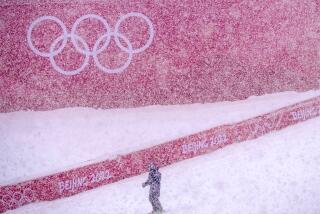U.S. hopes take a powder in men’s giant slalom
- Share via
Reporting from Whistler, Canada — The giant slalom was a giant disappointment -- at least by America’s suddenly-since-last-week lofty Alpine standards.
The United States’ streak of six consecutive races with at least one medal ended Tuesday at Whistler Creekside when Bode Miller bowed out early in the first run and Ted Ligety came in late for the second run, finishing in ninth place.
Switzerland’s Carlo Janka won the race with a two-run time of 2 minutes 37.83, holding off two Norwegians for the gold.
Kjetil Jansrud finished second with Aksel Svindal adding bronze to his gold (super-giant slalom) and silver (downhill).
Janka, considered a multi-medal contender before the Vancouver Games, finally came through after missing bronze in the super combined by 0.22 and ending up 11th in downhill and eighth in super-G.
“There was a lot of pressure but I was able to swallow it,” Janka said. “It was a great day for me and it’s been a great Olympics for the whole Swiss team.”
Didier Defago, Janka’s teammate, opened the Alpine schedule by winning the downhill.
America’s (ski) Team came up a few gates short -- with Ligety’s top 10 (barely) the best it could muster.
Miller, winner of bronze, silver and gold in his first three races, got wobbly on his first run, going down to a hip at one point, then skied out into a “did not finish.”
Even with his success here, Miller’s early exit in a gate race was hardly a surprise. He didn’t even draw a top-30 bib because his world ranking is so poor. Miller wore bib No. 31, but not for long.
Miller had a post-race flashback to Turin, Italy, when he skied back to his condo without passing through the media zone, only to be chased down by the Associated Press.
“I’m taking more risk than everyone else,” Miller said of his failure to complete his first run. “That’s partly why I’m able to get medals. It looks easy when you make it.”
Ligety’s ninth-place finish was a much bigger story. He was the top-ranked giant slalom skier on the World Cup circuit and considered a gold-medal contender.
“It’s disappointing not to keep the streak going, with medals and races,” said Ligety, the Olympic champion in the combined four years ago. “Especially since I should have, of all the guys on the team, I should have been getting medals.”
Ligety was in eighth position after the morning run, 0.60 behind the leading time posted by Janka, but still within striking distance.
“I didn’t feel defeated in between runs,” Ligety said. “I’ve make up more time than that before.”
But Ligety, the 23rd racer down in the afternoon, got held up just as it started to snow, and he never threatened the leaders.
Ligety took some comfort in knowing the Austrian men got shut out again, finishing fourth, fifth and sixth.
“It’s really cool the Austrians haven’t medaled,” he said. “Especially being the skiing powerhouse that they are.”
Through seven events, the Austrians have two medals -- a gold and a bronze -- both by the women.
Austria won 14 medals four years ago in Turin, 12 more than the United States.
With three events to go in Whistler, the United States’ eight medals lead the nations count. Norway and Switzerland are tied for second, at four, followed by Austria’s measly two.
The Austrians have led the medal count in nine of the previous 17 Winter Games -- including the last three.
Benjamin Raich, the defending Olympic champion in giant slalom, finished sixth Tuesday and then, to make his bad day complete, got his number randomly drawn for drug testing.
“It’s disappointing,” he said of his country’s alpine performance. “But it’s skiing, and it’s life.”
The Austrian men are getting hammered by the home country press for their failure to meet expectations.
“It’s hard to be on top,” Raich said. “Also, for us, we have good names but we have to perform every time. We are just normal people and human, not machines.”
Raich, who will try to defend his Olympic slalom title in the men’s final race Saturday, isn’t ready to concede total defeat.
“We have one more race and we’ll see,” he said.
More to Read
Go beyond the scoreboard
Get the latest on L.A.'s teams in the daily Sports Report newsletter.
You may occasionally receive promotional content from the Los Angeles Times.







